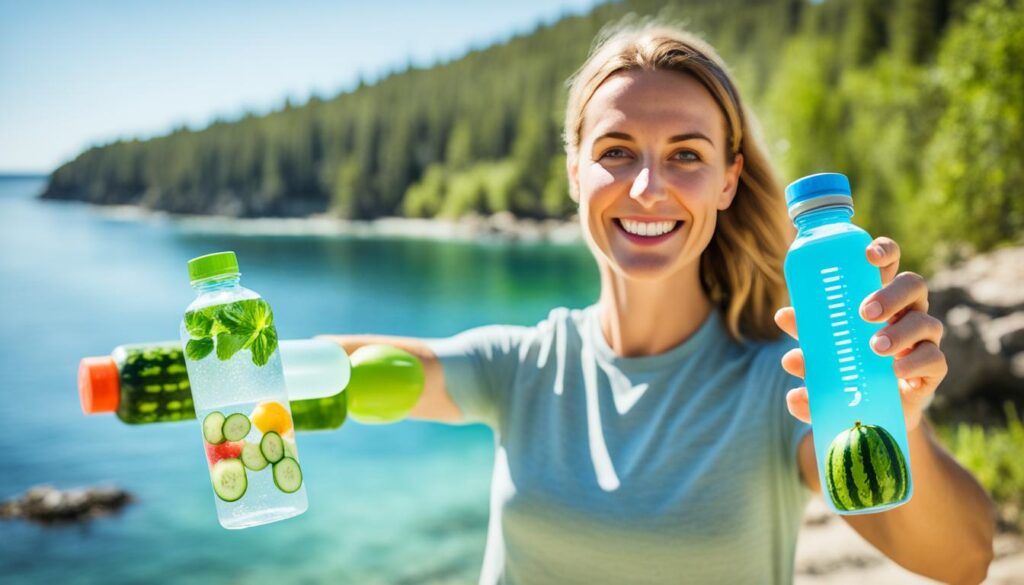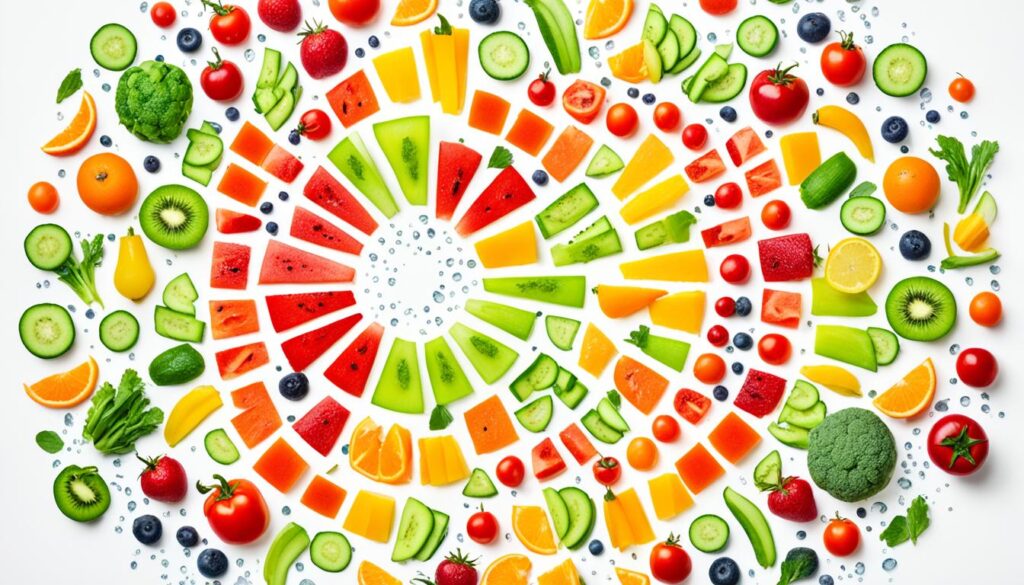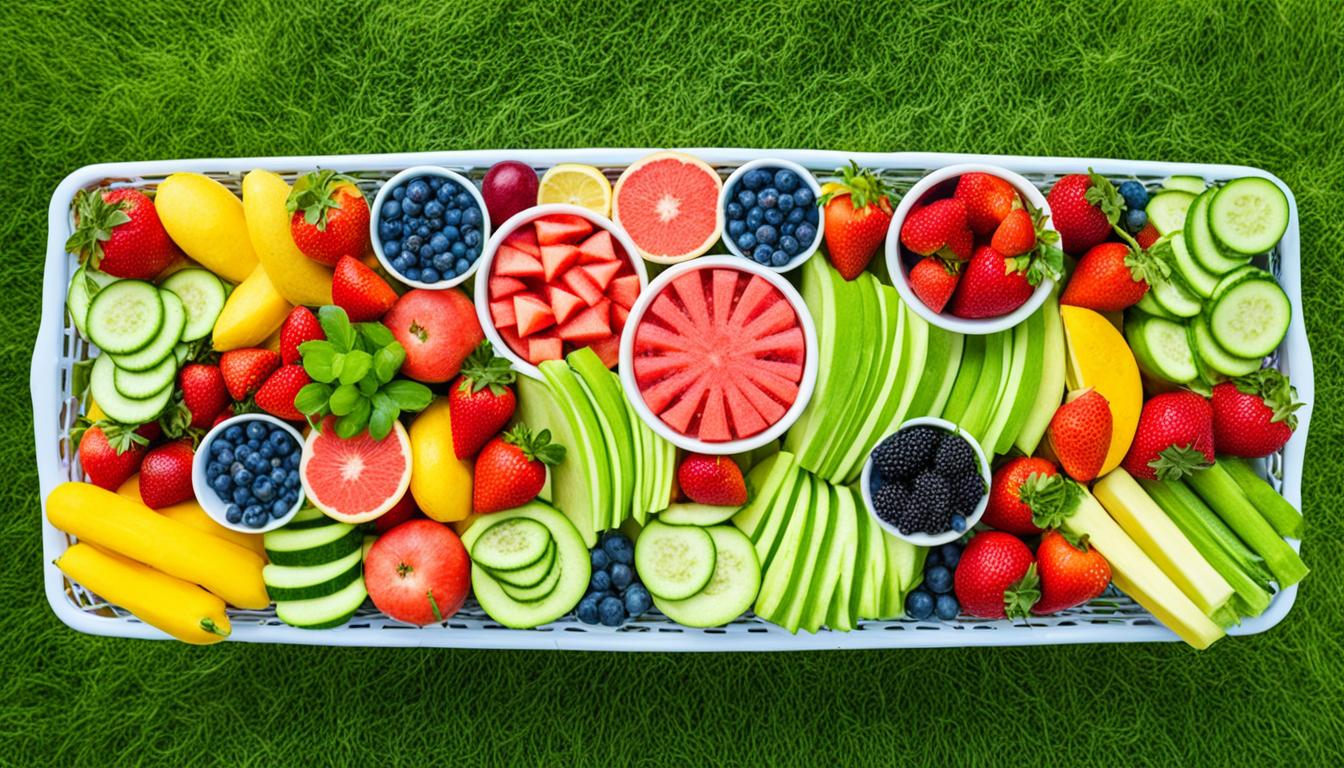Staying hydrated is key for good health. Yet, drinking a lot of water every day can get tough. Luckily, you can up your water game with snacks, fruits, and veggies that are high in water. Adding these items to your meals will boost your water intake. It also helps your body work well.
It’s essential to drink water but know this: about 20% of your needed water comes from food you eat1. Foods like raw fruits and veggies are full of water. They’re tasty and keep you hydrated. Adding these to your meals makes hitting your daily water goal easier.
Don’t forget about broths, soups, and low-fat milk. They are great for staying hydrated and have little calories. These drinks are a nice change from plain water. They also bring important nutrients. Mixing these with foods that have electrolytes helps you stay hydrated well.
Key Takeaways:
- Consuming water-rich fruits, vegetables, and snacks can help you stay hydrated naturally.
- Your body gets about 20% of its daily water needs from the foods you eat.
- Raw fruits and vegetables are among the best foods for hydration due to their high water content.
- Broths, soups, and low-fat milk can also contribute to hydration while providing essential nutrients.
- Combining hydrating foods with electrolyte-rich options can support optimal hydration levels.
Why Hydration is Important for Your Health
Staying hydrated is key to your health. Your body is about 60% water, showing how important it is. Water helps keep your body running smoothly. It keeps your temperature normal, fights infections, removes waste, and feeds your cells2.
Good hydration does more than keep you physically fit. It boosts your mental health too. If you’re not drinking enough water, you might struggle with sleep, memory, or staying in a good mood2. Drinking enough water also stops health problems like constipation and UTIs2.
The Role of Water in Your Body
Water has many jobs in your body. It helps keep you at the right temperature, stops infections, and gets rid of trash. It also brings nutrients to your cells, makes joints move smoothly, and keeps your skin glowing2.
Drinking lots of water helps your body use vitamins and minerals better. Plus, staying hydrated can lower your risk of asthma when you exercise2.
Signs and Symptoms of Dehydration
Dehydration happens when you lose more water than you take in. Signs like constipation, dry skin, and feeling tired mean you need more water. If dehydration gets bad, it can cause serious issues like brain swelling or kidney failure2.
Without enough water, you might find it hard to focus or remember things well. This affects your work and everyday life2.
Men should drink about 15.5 cups (125 ounces) of water daily. Women need around 11.5 cups (91 ounces). But, your needed amount can change based on your weight, how active you are, and the weather3,4.
Eating foods with lots of water also helps. Fruits and veggies like cucumbers, lettuce, and watermelon are great choices. Aim for those with over 80% water content. They boost your hydration4.
How Much Water Should You Drink Daily?
The amount of water you need to drink each day can change. It depends on your weight, how active you are, and your health. Men should aim for 15.5 cups (3.7 liters) of fluids daily. Women, on the other hand, should try to get 11.5 cups (2.7 liters) daily5. Remember, 20% of your fluid intake comes from what you eat. The rest is from what you drink5.
The suggestion to drink eight glasses a day is well-known. But, needs change based on exercise, where you are, health issues, and if you’re pregnant or breastfeeding5. The Eatwell Guide says aiming for 6 to 8 cups a day is good for most people6. Keeping hydrated is simple – drink whenever you’re thirsty. This shows, what you need isn’t the same for everyone5.

Factors Affecting Your Daily Water Needs
Your daily water needs are affected by many things. This includes your weight, how active you are, and your health7. If you’re very active, live in a hot or dry place, you need more water7. Also, if you eat salty or spicy foods or drink a lot of caffeine, you might need to drink more7.
Some health conditions can mean you need more water. For example, if you have a fever or are taking certain drugs, drink extra7. If pregnant, stick to less than 200mg of caffeine a day to keep healthy. And when pregnant, nursing, sick, or after intense workouts, you’ll likely need more water7.
Some fruits and veggies are almost all water. Think of watermelon and spinach. They can make a big difference in how much fluid you need5. Adding these to your meals ensures you’re getting water alongside vital nutrients.
Hydrating Foods to Include in Your Diet
Staying hydrated is key for good health. In addition to water, many foods help keep us hydrated. The average person gets 20% of their water from food1. By choosing water-rich foods, you support hydration and add variety to your meals.
Fruits with High Water Content
Fruits are not just tasty but also full of water and nutrients. Watermelon is 92% water18. Strawberries and peaches are about 91-92% water18. Enjoy other hydrating fruits like cantaloupe, oranges, and apples. They’re 85-90% water89. Grapefruit, known for its water and fiber, is a good option too9.
Vegetables Rich in Water
Vegetables are a great way to stay hydrated, often with 90% or more water. Cucumbers are the most hydrating at 95-96% water18. Lettuce varieties are up there too, at 95-96% water189. Celery and radishes follow suit, 95% water1. Zucchini and tomatoes are 94-95% water189. You can also count on asparagus, bell peppers, and dark leafy greens for hydration, as they contain about 92% water19.
Other Foods that Contribute to Hydration
Fruits and veggies aside, there are other foods to keep you hydrated. Broths and soups, often water-based, are nourishing and about 92% water8. Boost their nutrient value by adding veggies like broccoli and carrots1.
Skim milk is another top choice for staying hydrated. It’s 91% water and rich in vitamins8. Plain yogurt is over 80% water9. And if you need electrolytes, turn to coconut water, which has magnesium and potassium9.
| Food | Water Content |
|---|---|
| Cucumber | 95-96% |
| Iceberg and Romaine Lettuce | 95-96% |
| Celery | 95% |
| Radishes | 95% |
| Zucchini | 94-95% |
| Tomatoes | 94% |
| Watermelon | 92% |
| Strawberries | 91-92% |
| Skim Milk | 91% |
| Cantaloupe | 90% |
Best Foods to Eat for Hydration
Keep your health in top shape by staying hydrated. Drinking water is key, but eating water-rich fruits and veggies helps too. Your body can get up to 20% of its water needs from food each day4. Adding these foods to your meals is a great way to stay hydrated and get important nutrients and antioxidants.

Top Water-Rich Fruits for Hydration
Fruits are tasty, healthy, and great for staying hydrated. Here are some top picks:
- Watermelon: It’s 92% water, making it perfect for hot days4. A cup of watermelon has over 1/2 cup of water, plus fiber, antioxidants, and vitamins9.
- Strawberries: With 91% water, they’re also full of fiber and vitamins8. Plus, they can help fight inflammation and lower heart disease and cancer risks8.
- Cantaloupe: A slice offers over a half cup of water and 90% water content89. It’s also a good source of fiber and vitamin A for strong immunity8.
Most Hydrating Vegetables to Include in Your Meals
Vegetables are packed with nutrients and water. Check out these hydrating options:
- Cucumber: At 96% water, cucumbers are not just water-rich but low in calories too4. They also have vitamin K, potassium, and magnesium8.
- Lettuce: Iceberg and romaine lettuce top the list with 96% and 95% water content49. You get fiber, vitamins K and A, and a bit of folate from them8.
- Zucchini: A big 94% water, zucchini is a fantastic choice for staying hydrated49. It’s also healthy and delicious8.
| Food | Water Content | Nutritional Benefits |
|---|---|---|
| Celery | 95% | It’s full of water and fiber, making it a great snack for hydration49 |
| Radishes | 95% | Rich in water, yet low in calories4 |
| Tomatoes | 94% | Packed with water plus antioxidants like lycopene49 |
| Bell Peppers | 92% | They’re hydrating and full of nutrients4 |
| Spinach | 92% | Has lots of water, along with iron, calcium, and fiber49 |
Adding these fruits and veggies to your meals will up your hydration. And you’ll get loads of health benefits too.
Don’t forget: Keeping hydrated is vital for your health. Try to eat various hydrating foods all day to help your body work its best.
Tips for Incorporating Hydrating Foods into Your Meals
Adding water-rich foods to your daily meals and snacks helps boost your hydration. By being creative, you can use hydrating fruits and veggies to make tasty dishes. This way, you stay refreshed and alert all day.
Enjoying fruits as snacks is an easy start. For example, watermelon is 91% water and gives 4.9 oz of water per diced cup10. Strawberries are much the same, at 91% water10. These fruits are great for a refreshing treat on their own or with other snacks.
Salads are also a great choice for meals that hydrate. Use greens like lettuce, which is 96% water8, and add cucumbers (95% water8), tomatoes (94% water10), and zucchini (95% water, providing 4.2 oz of water when chopped10). Add lean protein and dressing for a tasty and hydrating meal.
Smoothies combine many water-rich foods into one. Add watermelon (92% water8), strawberries (91% water8), and greens like spinach or kale. A scoop of protein or Greek yogurt makes it filling and hydrating.
Mixing water-rich foods with others can be tasty. For example, pair cucumber (95% water8) and lettuce (96% water8) with hummus or cottage cheese. Or, make a hydrating lunch by filling whole-grain pitas with tomatoes (94% water10) and bell peppers (92% water10).
| Hydrating Food | Water Content | Serving Size | Water Per Serving |
|---|---|---|---|
| Cucumber | 95% | 1 whole | 10 oz |
| Zucchini | 95% | 1 cup, chopped | 4.2 oz |
| Celery | 95% | 3 medium stalks | 3.9 oz |
| Watermelon | 91% | 1 cup, diced | 4.9 oz |
| Strawberries | 91% | 1 cup, diced | 4.9 oz |
By being mindful to include many hydrating foods in your diet, you help your body stay hydrated. This supports your overall health. So, explore the kitchen and enjoy the many delicious, water-rich food options available!
Hydrating Beverages and Snacks
It’s vital to stay hydrated for good health and well-being. Water is the top choice, but other drinks and snacks can also help. They’re great in summer or after working out, when you need to replace fluids and electrolytes.
Low-Calorie Drinks to Keep You Hydrated
Besides water, many low-calorie drinks can keep you hydrated. Unsweetened tea and coffee are perfect for staying hydrated. They don’t add extra calories or sugar. Flavored sparkling water is a tasty option without added calories.
Coconut water is full of electrolytes, perfect for after a workout. It’s rich in magnesium and potassium9. Skim milk is also a good choice and helps replace fluids lost during exercise9.
Water-Rich Snacks for On-the-Go Hydration
Eating fruits and veggies with lots of water keeps you hydrated on the go. Watermelon is great, with about 92% water content11. It also gives you fiber, antioxidants, and vitamins C and A9.
Other good choices are cucumbers (95% water) and grapefruits and oranges (88% water). Apples and tomatoes are also packed with water and nutrients like lycopene911. Celery is a convenient, hydrating snack too, thanks to its water and fiber.
Diversifying your diet with hydrating drinks and snacks is key for meeting your daily fluid needs. It also helps your body function at its best. Opt for low-calorie drinks and plant-based options to keep your energy up, especially in summer or after a workout111.
Conclusion
Drinking enough water is vital for your health. It helps every part of your body work well, keeps you cool, and moves nutrients around12. It’s recommended to drink 6 to 8 glasses of water a day13. But, eating foods with lots of water is also a great way to stay hydrated. This includes fruits, veggies, and light drinks. Adding these to your meals can help meet your daily water needs and keep your body in top shape.
Include foods like cucumber, lettuce, celery, and watermelon in your diet for good hydration. They’re full of water and good for you. Plus, even coffee and tea can count towards your water for the day. Just keep your caffeine intake below 400 milligrams13.
Eating and drinking the right things can keep you hydrated. Pair foods rich in water with other healthy choices. That way, you create meals that are both hydrating and nutritious. Staying hydrated is crucial for your health. Including water-dense foods in your diet can be both tasty and effective in reaching this goal. So, enjoy snacks, drinks, and cooling summer treats to give your body the water it needs.
Source Links
- https://www.uclahealth.org/news/15-food-that-help-you-stay-hydrated
- https://www.healthline.com/health/food-nutrition/why-is-water-important
- https://health.ucdavis.edu/blog/good-food/why-its-important-for-you-to-drink-water-and-stay-hydrated/2022/07
- https://www.uclahealth.org/news/article/15-food-that-help-you-stay-hydrated
- https://www.mayoclinic.org/healthy-lifestyle/nutrition-and-healthy-eating/in-depth/water/art-20044256
- https://www.nhs.uk/live-well/eat-well/food-guidelines-and-food-labels/water-drinks-nutrition/
- https://www.healthline.com/nutrition/how-much-water-should-you-drink-per-day
- https://www.healthline.com/nutrition/19-hydrating-foods
- https://www.realsimple.com/food-recipes/recipe-collections-favorites/healthy-meals/foods-for-hydration
- https://www.health.com/hydrating-foods-8608127
- https://rockymountainivmedics.com/foods-that-keep-you-hydrated/
- https://www.news-medical.net/health/Healthy-Hydration-The-Science-and-Importance-of-Drinking.aspx
- https://familydoctor.org/hydration-why-its-so-important/




